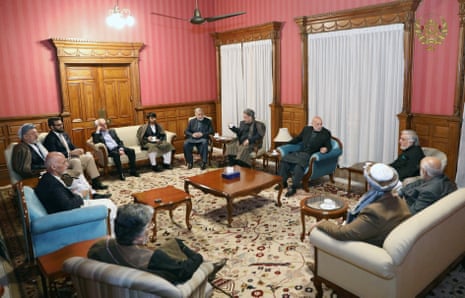People in Afghanistan protested on social media that no women were present at a high-level government meeting, despite assurances from the president that they would be involved in important decision-making roles.
The outcry followed a tweeted photo of a meeting of 12 political leaders at the presidential palace – all of them men.
President Ashraf Ghani’s spokesman, Sediq Sediqqi, who posted the image on Thursday, wrote that he thanked the men for their “efforts in the political agreement” they had achieved, calling it an important step towards national unity and political consensus. But both men and women voiced their concerns that none of the country’s many influential women had been present.
Ali Adili, a researcher for the Afghanistan Analysts Network, tweeted: “Where are the women?”
Freshta Karim, an activist and director at Charmaghz, a non-profit promoting education, said: “We are fighting a double fight; with the Taliban, but also with our own government.
“None of them [men] naturally feel obliged to include women in the decision-making. We are expecting the government to fight for our rights on the table with the Taliban, but how will they do this when they keep excluding us?
She added: “This is how ugly they look when they exclude us.”
More than 40 years of war, including years of Taliban rule, has led to women being stripped of basic rights, including education and freedom of movement. Many women are still made to stay at home and often do not have equal access to schooling.
Some people dismissed the criticism on social media, saying there would be no point to include “any powerless woman”, and applauding the ethnic diversity of the men in the image.
Earlier this year, Ghani said women’s participation was now seen at all levels in Afghanistan, yet recent meetings – including the signing of a political agreement between the president and his rival, Abdullah Abdullah, which ended months of political deadlock and will mean the formation of a new cabinet – were held in the absence of women leaders.
“This is concerning, especially as the government is preparing for intra-Afghan negotiations with the Taliban,” said Shaharzad Akbar, chairperson of Afghanistan’s Independent Human Rights Commission (AIHRC).
“There aren’t enough women in the negotiation team – numbers are lower than expected and there is a possibility that an almost fully male list of the cabinet is being put forward. This is concerning. It sends the message that the government’s leadership doesn’t take women’s voices, expertise and insights seriously.”
After a landmark deal between the Taliban and the US was signed in February, paving the way for a US troop withdrawal and direct negotiations between the Afghan government and the militants, a 21-member delegation for the talks was put forward by the government – only five were women. The team was due to discuss potential political power-sharing with the militants and human and women’s rights protection.
Sediq Sediqqi acknowledged the outcry over the photo on Twitter, and said the government would take note and assured women of their participation in the future.
“Afghan women aren’t at the sidelines anymore, but they are leaders,” he said, adding that current meaningful participation of women at all levels of society had been unprecedented in the country’s history.
“President Ghani’s main policy element on women empowerment for the past five years has not been symbolic, but a meaningful approach to elevate women and bring them to top state decision-making layers,” he said.
But after Ghani’s first election win in 2015, only three women ministers were nominated for the cabinet, resulting in protests throughout the capital, Kabul.
